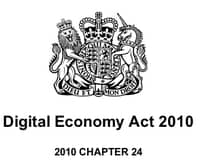 The Judicial review brought by disgruntled ISP's who see the Digital Economies Act as unfair has been turned down on all but one count, and this paves the way for a future where you could have your internet switched off for file-sharing.
The Judicial review brought by disgruntled ISP's who see the Digital Economies Act as unfair has been turned down on all but one count, and this paves the way for a future where you could have your internet switched off for file-sharing.
The DEA was rushed through parliament towards the end of Gordon Brown's premiership and gave free rein for websites to be blocked and in extreme cases to have your internet turned off if you were seen to be downloading pirated media.
The court has dismissed all complaints against the act apart from one, which sees ISPs freed from the requirement to pay 25 per cent of the costs of organising a governing body to oversee requests from those who seek to use the Digital Economy Act to tackle alleged copyright infringement using an ISP’s connection.
This ruling obviously has major ramifications for the freedom of the internet in the future, and for the ISP's which are now expected to weed out file-sharers from their networks.
Talk Talk who were dead against the draconian measures have said that they were "disappointed" in the ruling.”We will continue fighting to defend customers’ rights,” a spokesperson for TalkTalk confirmed – explaining that an appeal against the ruling is not off the cards.
The British Phonographic Industry were obviously very pleased with the ruling. “This judgement gives the green light for action to tackle illegal downloading in the UK,” There spokesman pleaded with the ISP to stop the fight and help them "work constructively" with rights holders on fighting copyright infringement.
I have personal experience within this field, yesterday I was contacted by the IFPI regarding music that I had posted on my music blog, the track was taken down and a strongly worded email was sent saying the we had infringed someone's copyright, when it actually fact we had been given the track by a label and PR to giveaway. So our worry is who is going to decide on each individual infringement, and from our own experience companies tasked with finding illegally hosted media are using automated bots to seek out file names, this practice is far from perfect, in fact it’s useless.
There have several worrying cases where old age pensioners have been sent legal papers demanding huge sums of money for media that have been accused of copying, even though they barely know how to use the internet let alone know how to torrent music or films.
A spokesperson for the Department for Culture, Media, and Sport has declared the court’s ruling a victory. “We are pleased that the court has recognised these measures as both lawful and proportionate,” the Department’s spokesperson claimed, referring to the complaints raised by ISPs on exactly those issues.
Thus far, there has been no official announcement of an appeal against the ruling – but with ISPs still seeing the terms of the Act as being disproportionate and expensive to implement, one is almost certain to be announced in the coming days.
We think this is a sad day for internet freedom in the UK and there are real concerns about the future of a free and open internet. Imagine your son or daughter, or even someone piggy-backing on your Wi-Fi are downloading illegally. Who should be punished the bill payer? The child that has been downloading without their parents even knowing what's going on? This is a real worry, and a legal mine field.
As ever let us know you thoughts on this massive story. Are you worried? Or do think it’s about time someone stepped up and put a stop to illegal downloads?
